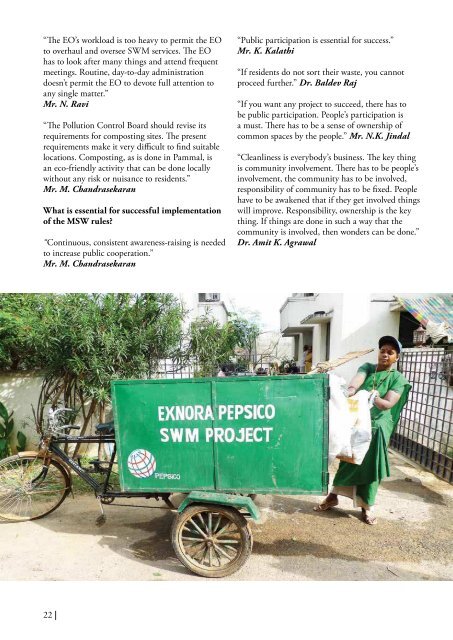Inspiring Progress document - Exnora Green Pammal
Inspiring Progress document - Exnora Green Pammal
Inspiring Progress document - Exnora Green Pammal
You also want an ePaper? Increase the reach of your titles
YUMPU automatically turns print PDFs into web optimized ePapers that Google loves.
“The EO’s workload is too heavy to permit the EO<br />
to overhaul and oversee SWM services. The EO<br />
has to look after many things and attend frequent<br />
meetings. Routine, day-to-day administration<br />
doesn’t permit the EO to devote full attention to<br />
any single matter.”<br />
Mr. N. Ravi<br />
“The Pollution Control Board should revise its<br />
requirements for composting sites. The present<br />
requirements make it very difficult to find suitable<br />
locations. Composting, as is done in <strong>Pammal</strong>, is<br />
an eco-friendly activity that can be done locally<br />
without any risk or nuisance to residents.”<br />
Mr. M. Chandrasekaran<br />
What is essential for successful implementation<br />
of the MSW rules?<br />
“Continuous, consistent awareness-raising is needed<br />
to increase public cooperation.”<br />
Mr. M. Chandrasekaran<br />
“Public participation is essential for success.”<br />
Mr. K. Kalathi<br />
“If residents do not sort their waste, you cannot<br />
proceed further.” Dr. Baldev Raj<br />
“If you want any project to succeed, there has to<br />
be public participation. People’s participation is<br />
a must. There has to be a sense of ownership of<br />
common spaces by the people.” Mr. N.K. Jindal<br />
“Cleanliness is everybody’s business. The key thing<br />
is community involvement. There has to be people’s<br />
involvement, the community has to be involved,<br />
responsibility of community has to be fixed. People<br />
have to be awakened that if they get involved things<br />
will improve. Responsibility, ownership is the key<br />
thing. If things are done in such a way that the<br />
community is involved, then wonders can be done.”<br />
Dr. Amit K. Agrawal<br />
Bottlenecks Impeding Wider<br />
Implementation of the Rules<br />
The government has enacted comprehensive rules for solid waste management<br />
and appropriated funds to initiate such work. However, the following factors<br />
impede widespread compliance with the rules:<br />
• Localities cannot afford the recurring costs of SWM activities mandated by<br />
the rules.<br />
• The public is not adequately aware of the hazards of pollution, the benefits<br />
of recycling and composting, and ways that they can prevent waste.<br />
• Localities do not have enough staff to implement the rules.<br />
• Sanitary workers need training for effective implementation of the rules.<br />
• The government is not enforcing its waste management directives and<br />
deadlines.<br />
• Localities lack proper sites for the safe and sanitary disposal of waste that<br />
cannot be recycled or composted.<br />
Recommendations - A Way Forward<br />
Throughout the course of this review, we compiled the following list of actions<br />
that the government should take to enable more localities to implement the<br />
MSW rules:<br />
1. Launch an intensive and sustained awareness campaign to end littering,<br />
promote waste reduction, reuse and recycling, and increase public awareness<br />
about the hazards of pollution.<br />
2. Local bodies need to acquire proper space for, and construct landfills. The<br />
lack of a proper disposal facility is a problem in most localities. Ideally, this site<br />
should be within five kilometres of the source of waste so that energy is not<br />
wasted by transporting waste long distance.<br />
3. Levy a <strong>Green</strong> Tax on all residences, or introduce a small levy similar to the<br />
educational cess to cover the cost of solid waste management.<br />
4. Induct and train more officials in waste management to meet the shortfall of<br />
qualified staff to coordinate and implement SWM.<br />
5. If SWM is outsourced or privatized, the contract must be designed to reward<br />
reduction of waste and specify measures to monitor compliance and ensure<br />
accountability.<br />
6. Solid waste management should be made a responsibility of the sanitation<br />
department, not the engineering department of each locality.<br />
7. Clarify the law by eliminating the ambiguity and inconsistencies of the<br />
MSW rules. Is house-to-house collection mandatory? Is source segregation of<br />
waste mandatory? Are community/street bins permissible?<br />
22 | | 23



